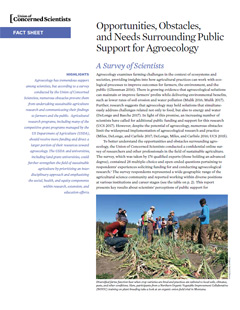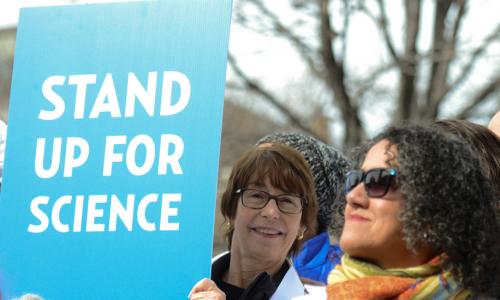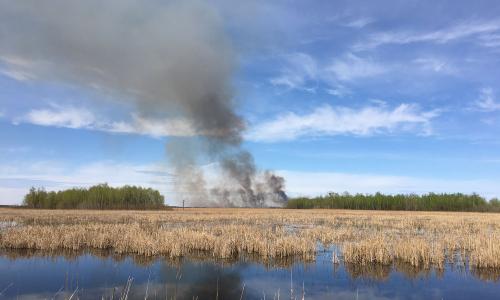Agroecology offers a science-based alternative to the industrial model that currently dominates U.S. agriculture. Agroecological practices like those that entail the use of “continuous living cover,” including cover crops, agroforestry, and perennial grazing systems, and the application of complex crop rotations have been shown to support farmers’ profitability as well as positive social and environmental outcomes. But more research is needed to better support farmers seeking to implement these practices across the enormous range of crop varieties, climates, and other variables in U.S. agriculture.
A growing number of scientists have added their voices to a statement calling for increased public investment in agroecological research. But beyond the need for additional funding, numerous other obstacles may prevent scientists from undertaking sustainable agriculture research or effectively communicating their findings to the public.
The report, based on a survey of 176 qualified experts with academic or professional experience in the field of sustainable agriculture, reveals some of these obstacles. Scientists emphasized that in addition to a general lack of public research funding, entrenched financial interests present significant barriers to their research. The lack of long-term funding support is also problematic for more complex, systems-based research. Lack of attention to social justice and racial equity was cited as an important issue that may limit the expansion of agroecological systems. Scientists also reported difficulty communicating their research findings outside of academic circles.
This survey of scientists also emphasized several opportunities to strengthen public support for agroecology. Experts agreed that there is widespread interest in sustainable agriculture research, including interdisciplinary, farmer-driven, and community-based research. Scientists also agreed that agroecology has the potential to be scaled up, confirming that experts in the field see the transformative potential of sustainable agriculture practices.
Based on the specific needs highlighted by agricultural scientists, we offer the following policy recommendations:
- Within the Research, Education, and Economics Mission Area at the USDA, emphasize the social and economic aspects of food system sustainability in research programs and RFAs.
- Ensure that grants are available at a variety of scales to serve a range of research needs, including both short-term funding opportunities for high-risk or pilot projects as well as longer-term grants necessary to sustain more complex field experiments and demonstrate the systemic impact of agroecological practices.
- Emphasize outreach and extension within existing USDA competitive grants programs, and improve training and support for media and public outreach within universities.
- Increase funding for interdisciplinary and agroecological research within USDA research programs, particularly for key programs with a history of funding such research, including SARE, OREI, ORG, and AFRI.




